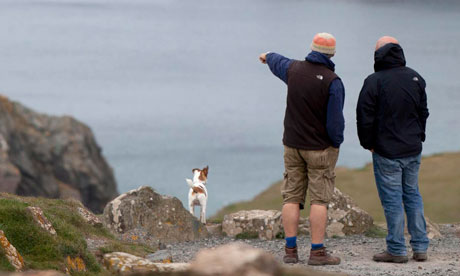
Early on a chilly spring morning, there are at least a hundred herring gulls wheeling above Lizard Point, the southernmost tip of Cornwall. Occasionally, one will loosen its bowels in my direction. Feeling exposed, I wander down a concrete ramp towards a shingle beach. Pausing by the disused lifeboat station, I see dozens of the things perched along the clifftops. They are even more menacing in silhouette, and it's impossible not to think of Daphne du Maurier's story The Birds, in which humankind faces a feathered apocalypse. That was set in Cornwall too.
All in all, then, it's a relief when my lift arrives. I'm hoping to encounter a lot of wildlife on the Lizard peninsula, but ideally it will be less evil-eyed and razor-beaked. The good news is that Justin, the man from the National Trust, has brought his jack russell with him. If necessary, we can throw him to the gulls while we make our escape.
We begin our seven-mile stroll a couple of miles north-west of Lizard Point, among the white and yellow blooms of blackthorn and gorse. The downs are attractive enough, in a bleak sort of way, but within minutes things get more postcardy, as we gaze down into Kynance Cove, with its turquoise water, sandy beach and jumble of islets and rocks. The big green one turns out to be Asparagus Island, named for the plant that grows on its slopes. The big difference between wild asparagus and its cultivated cousin, Justin says, is that the former's spears grow flat to the ground. The way the wind is whistling around us, you can understand why.
Heading down towards the beach, he explains why the peninsula is so popular with nature lovers. This is where you'll find Britain's biggest outcrop of serpentine, a rock of many colours said to resemble snakeskin. Not only is it beautiful, but it supports a range of alkali-loving plants. At least, I think that's what's going on. I am neither a geologist nor, like Justin, a botanist.
Which is a shame, because if I was, I would rarely go hungry. As we descend the rocky path, Justin points out half a dozen edible plants, from spinach-like sea beet to peppery rock samphire and three-cornered leek.
All too soon we clamber back out of the cove and head south among the pinks and blues of thrift and spring squill. The sea is to our right and far below us. "This is a great place for basking sharks," Justin says above Pentreath beach, before admitting it's too early in the year for them. But we can make out shoals of fish, scales flashing in the sun. Are these bass? Mackerel? Pollack? Neither Justin, nor photographer James, nor James's girlfriend Rosie, who has come along for the walk, can decide. A century or so ago we might have been looking at pilchards. The coastal path was used by "huers", the spotters whose job it was to steer fishermen towards their prey.
What about us, though? What can we still hope to see? Choughs, says Justin. This red-beaked, red-legged crow is not just Cornwall's "national" bird, but a living symbol of the Lizard's specialness. It vanished from Cornwall (and England) in the 1970s and only returned in 2001. Volunteers now guard the handful of nests. Where might we find them? Back at Lizard Point, hidden among the man-eating gulls.
First, though, we must say hello to some Shetland ponies. We meet Hamish and her (yes, Hamish is a she) three friends just south of Caerthillian Cove. There are 11 ponies in all on the National Trust land, brought here from Exmoor to graze the clifftops and encourage the insects on which the choughs feed. "They're lawn mowers!" says Rosie, as Justin breaks up some of their dung to show us what they've been eating.
At Lizard Point the gulls have mostly gone. But where are the choughs? I get excited about some unusually approachable crows with grey necks, before discovering that these are actually jackdaws. But then there they are – a pair of choughs, distinguishing themselves by their splayed primary feathers.
Fifteen seconds of acrobatics, and they vanish below the cliff edge. Never mind, though – we still have four or five miles to go. There's more to see.

